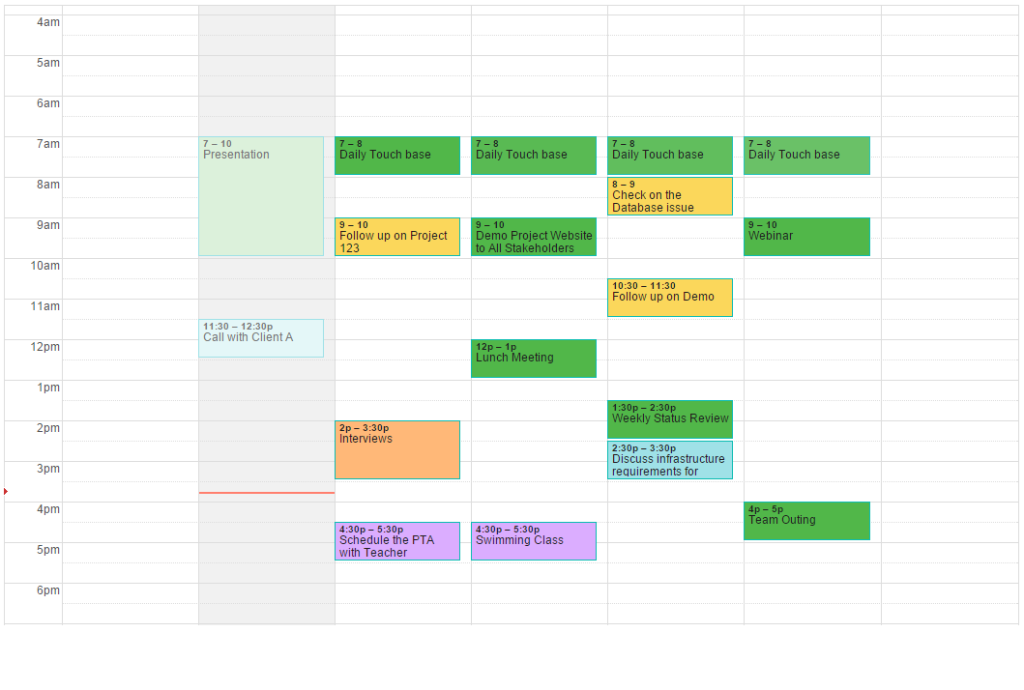Gone were the days when each of us was working on one and only one project or task at any given time. Multitasking has become the norm in today’s world; be it be in corporations or in an individual’s personal life. When you have too many things on your to-do list, it is easy to lose track of non-urgent items. You tend to spend time fixing and catching up on the urgent ones that you miss out important tasks until they become the urgent ones. The cycle goes on and at the end of the day, you feel you are always chasing something and things are getting out of control.
Does this sound familiar?
This overwhelming feeling of running around to get things done is due to lack of proper planning. Proactively planning ahead of time and making a habit to say “NO” are the key things to reduce stress and get your life under control. Read this about the myth of doing it ALL .
There are several productivity tools that help you be on track. But any tool is only as good as you tend to use it.
I have used several task tracking tools and apps, but I found the use of “calendar” to be most productive.
Professional Events
The use of your organizational calendar may not be new to you. You use it to keep track of your day to day schedule and also notify others of your availability and commitments.
There are several things to track in any professional role. As an IT leader or a prospective IT leader, you should be well prepared to handle time and reduce stress to that you can focus your energy on getting things done.
Catching up and having/keeping everything under control becomes a bigger challenge when you are handling impromptu or unplanned items and/or when you are delegating tasks; which could be overwhelming depending on your role
We use JIRA to keep track of all formal work streams and tasks lists, but there are a few that do not fall under this category that easily slip through.
Here are some scenarios of such things, that occur in corporate life –
1. You are handling impromptu or unplanned tasks. You assign tasks to someone else and rely on them to get it done.
2. You may be asked a question in a meeting and you will have to get back to them.
Here are some simple tips to help you stay on top of things without losing sight of them; so you can follow up as needed and mark them complete without forgetting them.
When it comes to professional To-do’s , you have two main categories.
1. Things that are expected of you
2. Things that you expect from someone else.
Here is how I use Calendar to track my work related to-do’s
1. I schedule a personal events to remind me of the following types of tasks.
- Important due dates
- Items that I am responsible for.
Ex: Task that I need to complete by a certain date.
2. Follow up tasks – a reminder for me to follow up to get something from someone.
Ex: I am waiting for Team A to complete their analysis so I can get an estimated effort on the timelines
- I need the testing team to give me the results of the test.
- I need the team to submit their time sheets so I can complete the team’s consumed budget for the month.
Personal Events
I use calendar to keep track of both professional events/commitments as well as personal events.
But why do we need a calendar for personal life? Here are some scenarios, that typically fall off the cracks.
A. You schedule an activity for your kid and you forget about it.
B. You schedule an doctor appointment and your spouse schedules another important visit at the same time – you cannot miss both, you end up arguing why each of you didn’t inform the other, or why they forgot about it.
C. You promise you will respond to your accountant on your tax information, but you forget the dead line.
D. The list can go on…
TOOL – I use GOOGLE CALENDAR to keep track of my personal appointments and events. Here is what I track and how it helps me stay on track.
Make a habit to schedule all your commitments on the calendar – both personal and professional. Here’s how I use my personal calendar to stay on track
1. Google calendar is my favorite and I have been using this to track
- Doctor appointments
- Family commitments
- Kids activities
- Set reminders for important tasks and due dates
- Dinner appointments
2. Share these calendar events with your family of friends based on the activities. For instance, I will include my spouse on all of our family events – such as Doctor appointments, Kids activities so that we both know where we should be at that time.
Similarly, if I am scheduling an outing with a group of friends, I include them in the invite so they have it on their calendar and we can keep up our commitments and appointments.
3. Another advantage of having all your events on calendar is it gives you a good visual representation of your day. If you see yourself committing to more than one event at a time, it helps you reschedule them.
- Color code the events based on the type , for easy visual representation…
To maintain your overall schedule, you can overlap both your personal and professional calendars to get the complete picture.
Staying proactive to help reduce stress, save energy and enjoy your life.
Being reactive is powerless ; being proactive is powerful. Plan smarter and stop chasing.
Let us know if these tips help you organize your schedule more efficiently and reduce your day to day stress. If you have any other tips that could help us, let us know in the comments below.


